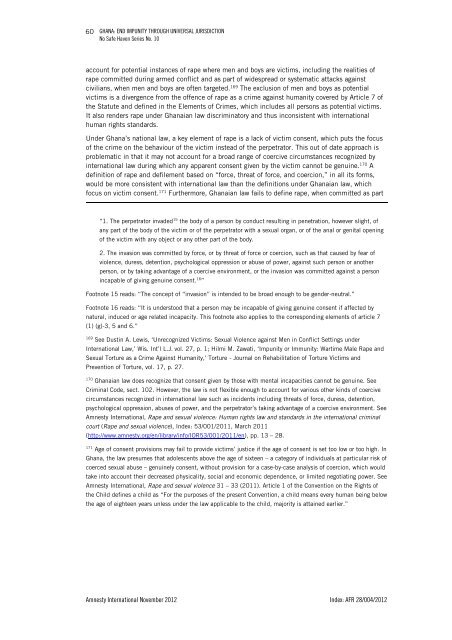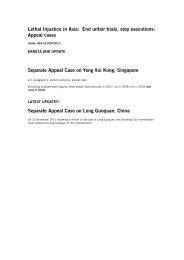Ghana - Amnesty International
Ghana - Amnesty International
Ghana - Amnesty International
You also want an ePaper? Increase the reach of your titles
YUMPU automatically turns print PDFs into web optimized ePapers that Google loves.
60GHANA: END IMPUNITY THROUGH UNIVERSAL JURISDICTIONNo Safe Haven Series No. 10account for potential instances of rape where men and boys are victims, including the realities ofrape committed during armed conflict and as part of widespread or systematic attacks againstcivilians, when men and boys are often targeted. 169 The exclusion of men and boys as potentialvictims is a divergence from the offence of rape as a crime against humanity covered by Article 7 ofthe Statute and defined in the Elements of Crimes, which includes all persons as potential victims.It also renders rape under <strong>Ghana</strong>ian law discriminatory and thus inconsistent with internationalhuman rights standards.Under <strong>Ghana</strong>’s national law, a key element of rape is a lack of victim consent, which puts the focusof the crime on the behaviour of the victim instead of the perpetrator. This out of date approach isproblematic in that it may not account for a broad range of coercive circumstances recognized byinternational law during which any apparent consent given by the victim cannot be genuine. 170 Adefinition of rape and defilement based on “force, threat of force, and coercion,” in all its forms,would be more consistent with international law than the definitions under <strong>Ghana</strong>ian law, whichfocus on victim consent. 171 Furthermore, <strong>Ghana</strong>ian law fails to define rape, when committed as part“1. The perpetrator invaded 15 the body of a person by conduct resulting in penetration, however slight, ofany part of the body of the victim or of the perpetrator with a sexual organ, or of the anal or genital openingof the victim with any object or any other part of the body.2. The invasion was committed by force, or by threat of force or coercion, such as that caused by fear ofviolence, duress, detention, psychological oppression or abuse of power, against such person or anotherperson, or by taking advantage of a coercive environment, or the invasion was committed against a personincapable of giving genuine consent. 16 ”Footnote 15 reads: “The concept of “invasion” is intended to be broad enough to be gender-neutral.”Footnote 16 reads: “It is understood that a person may be incapable of giving genuine consent if affected bynatural, induced or age related incapacity. This footnote also applies to the corresponding elements of article 7(1) (g)-3, 5 and 6.”169See Dustin A. Lewis, ‘Unrecognized Victims: Sexual Violence against Men in Conflict Settings under<strong>International</strong> Law,’ Wis. Int’l L.J. vol. 27, p. 1; Hilmi M. Zawati, ‘Impunity or Immunity: Wartime Male Rape andSexual Torture as a Crime Against Humanity,’ Torture - Journal on Rehabilitation of Torture Victims andPrevention of Torture, vol. 17, p. 27.170<strong>Ghana</strong>ian law does recognize that consent given by those with mental incapacities cannot be genuine. SeeCriminal Code, sect. 102. However, the law is not flexible enough to account for various other kinds of coercivecircumstances recognized in international law such as incidents including threats of force, duress, detention,psychological oppression, abuses of power, and the perpetrator’s taking advantage of a coercive environment. See<strong>Amnesty</strong> <strong>International</strong>, Rape and sexual violence: Human rights law and standards in the international criminalcourt (Rape and sexual violence), Index: 53/001/2011, March 2011(http://www.amnesty.org/en/library/info/IOR53/001/2011/en), pp. 13 – 28.171Age of consent provisions may fail to provide victims’ justice if the age of consent is set too low or too high. In<strong>Ghana</strong>, the law presumes that adolescents above the age of sixteen – a category of individuals at particular risk ofcoerced sexual abuse – genuinely consent, without provision for a case-by-case analysis of coercion, which wouldtake into account their decreased physicality, social and economic dependence, or limited negotiating power. See<strong>Amnesty</strong> <strong>International</strong>, Rape and sexual violence 31 – 33 (2011). Article 1 of the Convention on the Rights ofthe Child defines a child as “For the purposes of the present Convention, a child means every human being belowthe age of eighteen years unless under the law applicable to the child, majority is attained earlier.”<strong>Amnesty</strong> <strong>International</strong> November 2012 Index: AFR 28/004/2012
















